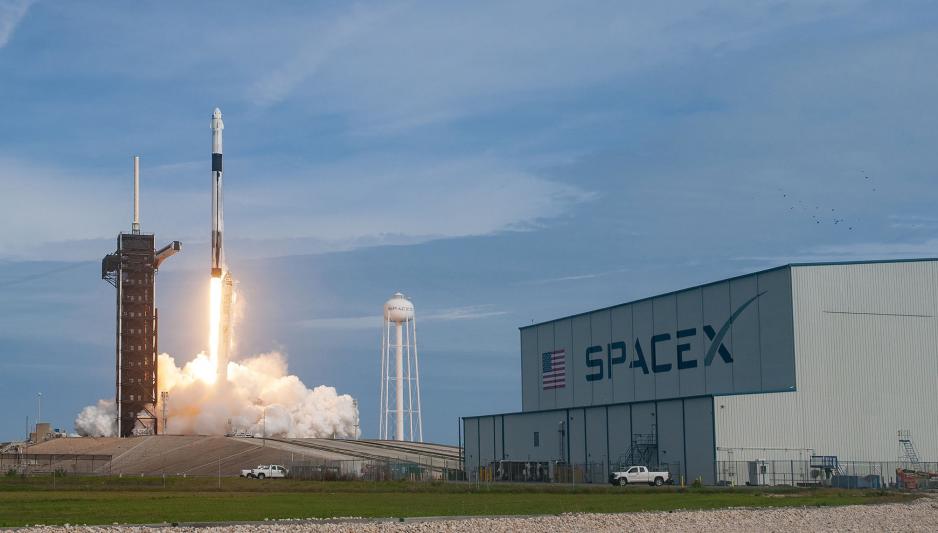Newsletter: High Seas in the High North

SpaceX launch of Falcon rocket. (Source: Courtesy of SpaceX)
Dear High North News reader!
Heavy fuel oil (HFO) is the dirtiest form of marine fuel and represents a serious risk for an area’s marine environment if an emission were to occur, and it has e.g. been banned in Antarctic areas for a long time.
“Ban” on HFO
The UN’s maritime organization IMO has now agreed on a draft regulation that will phase out use and carrying of HFO in the Arctic from 1 July 2024, after having worked on the draft for a decade.
However, environmental groups criticize loopholes that will postpone the ban until 2029 for vessels sailing under the flag of one of the eight Arctic states. The loophole will in practice mean that vessels sailing along the Northern Sea Route (NSR) under Russian flag will be exempt from the regulation for nearly a decade to come.
The proposal from the IMO also faces opposition from the industry. CEO Verner Hammeken of Greenland’s Royal Arctic Line (RAL) is worried about the economic consequences that the HFO ban will have for the company. He requests dispensation from the regulations so that their vessels can continue to use and carry HFO until 2029.
Warns against being naïve
Those of you who have followed High North News recently cannot have missed the story about the [Norwegian] Foreign Intelligence Service’s warning against threats from China and Russia. The Focus 2020 report points a.o. to Russia’s developing of new weapon systems and refers to the six new weapon systems presented by President Vladimir Putin in his State of the Nation speech in 2018. However, opinions differ on what the new weapons mean for the security situation in the Arctic. “To Norway, the new Russian weapon systems do not constitute a dramatic change to the potential threat from Russia”, says Paal Sigurd Hilde, researcher at the Norwegian Institute for Defense Studies.
To the Arctic on a more general level, there is disagreement about what these weapons mean to the security situation in the region. Rob Huebert at the University of Calgary, Canada, is not quite as eased about it: “We have had a general belief that Arctic exceptionalism somehow means that geopolitical realities just disappeared”, he says and warns against being naïve in the face of Russian weapon systems.
On the other hand, former [Norwegian] Environmental Minister Erik Solheim argues that the FIS threat assessment of China reeks to much of blueprint from the USA and that everything China does is taken in the worst meaning possible. He argues that the West should welcome China to the Arctic and also warns against a world order in which one has to choose between the USA and China.
Partnering with Tesla founder
The American armed forces, including the coast guard, have long expressed their worry about unreliable communication in the polar areas. In the Arctic, a series of the traditional land-based communication forms as well as satellite-based connectivity are missing.
Now, the Americans want to enter into cooperation with Tesla founder Elon Musk’s company SpaceX to improve its communication capacity in the Arctic.
New steps towards Arctic data center
Two years ago, American Danny Hayes and his team launched plans for data centers and smart city solutions in Bodø and Nordland. The project fell apart when tech giant AECOM withdrew, allegedly as a consequence of massive and negative press coverage.
Now Danny Hayes’ former partners try to realize the data center – without Hayes. The estate is the same, the actors too. AECOM is back on board. “Many investors will see it as a warning flag that they ripped off an idea they couldn’t properly execute with relationships they did not originate”, Hayes says to High North News.
Solberg in Svalbard
With the excuse that she were to increase the number of seed packs in the Svalbard Global Seed Vault to more than one million, Norwegian PM Erna Solberg went to Svalbard to mark Norwegian presence and sovereignty, in particular following critical statements from Russia regarding how Norway manages its rights and obligations according to the 100-year old Svalbard Treaty.
However, businesses in Svalbard fear Solberg’s ambition about strengthening Norwegian presence, amongst others through a more hands-on and state-managed housing policy, will work contrary to its aims.
Doreen Lampe of Spitzbergen Adventures says they are already “struggling really hard” and fears that the new housing initiative will mean an end to her tourism company.
Embarrasing from the press
During her visit to Svalbard, the PM requested a visit to the area where an avalanche took to lives in December 2015. She went there along with some of the victims; parents who - in a most surreal way - found their two little children alive under the giant amounts of snow pushed into the houses and moved them yards away from their foundations. Sadly, Erna Solberg spent more time defending her heavily pressured Fisheries Minister than bringing attention to what she was there to do. "Standing at the scene, she had to answer questions about recently diseased Norwegian artist Jahn Teigen and Fisheries Minister Geir Inge Sivertsen. I am ashamed on behalf of journalism", our Editor-in-Chief Arne O. Holm writes in this week's Friday op-ed.
Thank you and goodbye
With this newsletter and these stories, I want to thank you and say goodbye. Being a News Editor at High North News for the past year has been extremely educative and exciting, which I muse over here. However, all things must come to an end and my Arctic adventure is over for now.
Thank you for following!
Siri Gulliksen Tømmerbakke
News Editor, High North News
